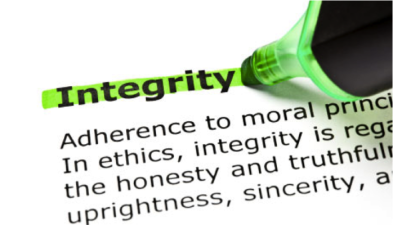NOTE 04/11/2016
With regards to the first comment made by Tarryn-Leigh Izally and the third comment made by Khurshiedah Jaffer, I have read through my post and corrected all the grammatical errors found.
Integrity and wrongdoing is an aspect that occurs in our daily lives and can take place in any environment at any time. As human beings, we are often blind to wrong doing or we are unaware of our own wrongdoings.

When I was on my ICU block, every morning I would walk into the ward and greet the nursing staff as well as any other health professionals. Due to time management within the ICU I would do a general, friendly greeting, instead of greeting each individual. The ward is small so all staff heard me and would often respond. During my second week in the ICU I did my general greeting as per normal and commenced with my physiotherapy treatment. I performed chest physiotherapy on my patient and then proceeded to suctioning. The patient was IsiXhosa speaking and was refusing to be suctioned. He kept forcing my hands away, and pulling on all his lines and attachments. Due to a language barrier he did not completely understand what I was saying to him, and his chest was full of secretions so he required suctioning. Due to the nurses having good knowledge and practical skills with suctioning, I ran to the closest IsiXhosa speaking nurse I could find. I asked the nurse in a kind and respectful manner if she could please come assit me as soon as possible. In a sarcastic and disrespectful manner she responded, “Good morning, how are you? You do know that you can greet before asking for assistance?” I could not believe the attitude that I received from another health professional. She then preceded to assit me after I apologized. Following her assistance I thanked her. She looked at me, completely and blatantly ignored me and then walked away.

It was not what the nurse said to me but it was the way and the manner in which she said it. I am there to learn and if it had been said in a more respectful manner I would have learnt a valid lesson. Due to being a physiotherapy student and the nurse being a qualified health professional I immediately put myself as the person in the wrong. I was reminded (by my conscience) of this situation for a long period of time. I thought about it very often as I felt somewhat guilty.
I feel that the nurse completely undermined me. Yes I am still a student and yes I am still learning, but I did not deserve to be spoken to in a sarcastic and disrespectful manner. I professionally and generally greeted all nurses in the morning upon my arrival. When asking the nurse for assistance I asked it in a respectful, friendly and professional manner, after explaining my situation to her. I apologized for “not greeting her” and following her assistance I thanked her in a respectful manner. How could I have possibly gone wrong? Was I in the wrong? Being the student that I am it really affected my self-esteem and my self confidence in the working environment.
The term “profession” means “a dedication, promise or commitment publicly made”. To be a good health care practitioner, requires a life-long commitment to sound professional and ethical practices and an overriding dedication to the interests of one’s fellow human beings and society (HPCSA, 2008).
As health professionals we are enforced to treat all patients with dignity and respect. The same applies for our fellow colleagues and health professionals. Health professionals make commitments following graduation and prior to entering the clinical environment. Gradually and unthinkingly these commitments become compromised. This is often due to things such as not thinking before speaking, or due to personal issues coming from the home environment. As a health professional the nurse conducted herself poorly. Professional misconduct includes failing to maintain a standard of practice of the profession or contravening a standard of practice of the profession as set out in the by-laws (Ontario Professional Foresters Association, n.d.).

From this ethical clinical experience I learnt the following: Do not respond in the manner in which others respond towards you. Remain professional, stick to commitments made and do not let professional misconduct and wrong doing by another health professional affect the way you perform in the clinical environment.
References:
HPCSA. (2008). General ethical guidelines for the health care professions. Booklet 1. Retrieved on the 29 September, 2016 from: http://www.hpcsa.co.za/Uploads/editor/UserFiles/downloads/conduct_ethics/rules/generic_ethical_rules/booklet_1_guidelines_good_prac.pdf
Ontario Professional Foresters Association. (n.d.). Professional Misconduct Defined. Retrieved on the 29 September, 2016 from: https://secure.opfa.ca/regulation-enforcement/regulation-profession/general-standards-guidelines-members/professional


Hi Tayla,
I can definitely relate to your post. The nursing staff in general can sometimes be unwelcoming and unfriendly, especially towards us as students. It can definitely knock our self esteem as physiotherapy students and negatively affect our performance if we let it.
However, I think it is important to see things from their point of views. These health professionals are constantly in that ward, they know the ins and outs of the patients, and they have the responsibility of doing the “unglamorous” work that most would not want to do. We then come in for a few minutes, disrupt their environment, and request (some demand) them to help us with this or that. I think it may be a blow to their self confidence as a health professional, especially if a qualified professional receives delegation from a student. In this situation we need to learn to humble ourselves and show them respect, even when it is not mutual. Well done for being respectful to this nurse even though she ignored you when you thanked her for her assistance. The lessons you have learnt from this experience are valuable and will continue to be for the rest of your career as a physiotherapist.
With regards to your post, I liked that you included multiple images; it complemented the post well. There are some minimal grammatical errors, like the use of commas excessively, which can be fixed. The references you used were correctly cited both in text and in the reference list.
I look forward to reading your other post!
LikeLike
Hi Tayla
Spot on!… I really love how you end of your post. One thing that I want to add is that you should always remember how you felt at that moment. In a few months’ time we will be qualified and teaching students and let us not do the same to them or to any other person. This I believe is one method to changing the attitudes of professionals within the medical field.
I really enjoyed your post. I like how you pictures and quotes contributed to your post. The best part of this post for me is the conclusion as it also reminded me of the importance of professionalism and having self-control in difficult situations.
Thank you for this great post.
LikeLike
Hi there, Tyler!
I thoroughly enjoyed reading your post. The topic is quite relatable for many students within the medical field. Once again, there is a good use of pictures and quotes which enhances your post. There were a few grammatical errors, however, the referencing was done well.
Thank you for the great posts 🙂
LikeLike